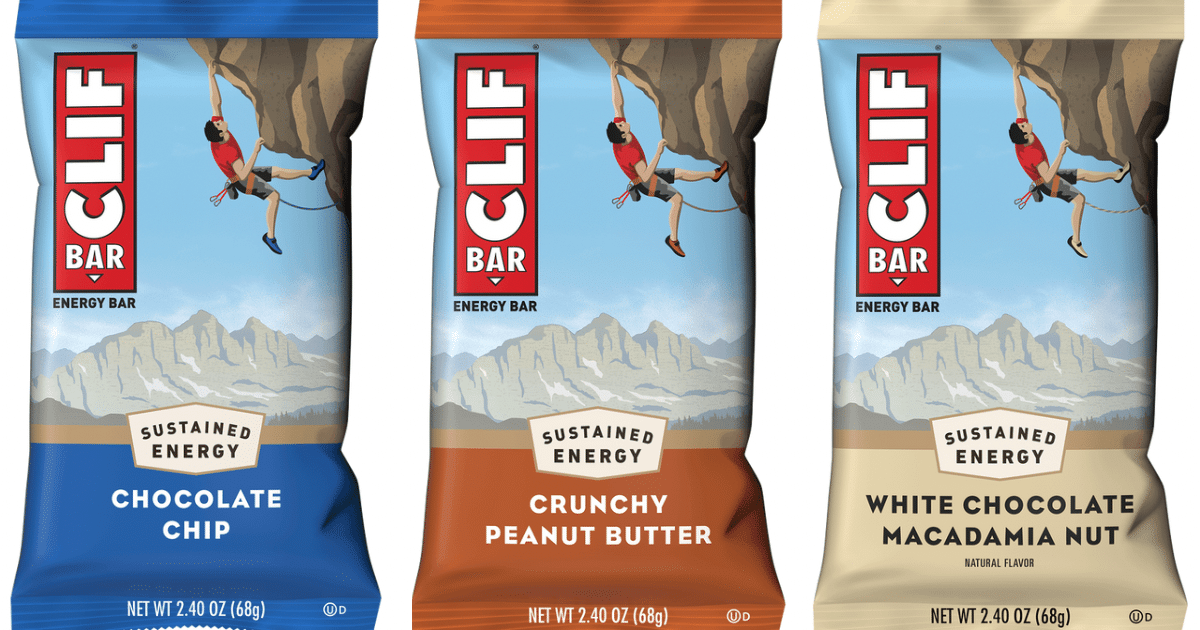Are Clif Bars healthy? This Clif Bar Dietitian Review will help you decide if Clif Bars are nutritionally sound and live up to their marketing claims. Read on for my review of taste, nutritional properties, ingredients, use, cost, and overall versatility before making your decision.
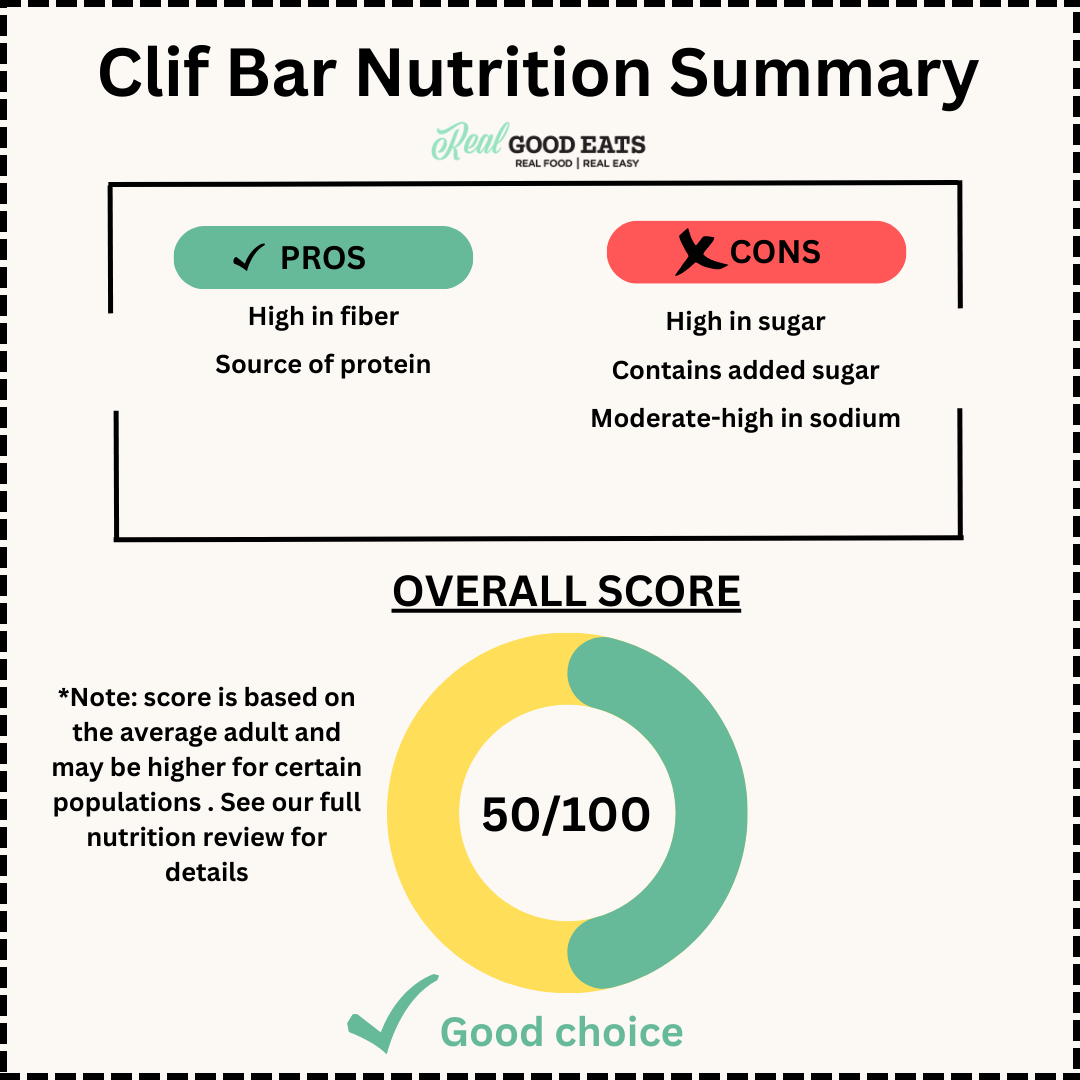
Read more about our Food Nutrition Score here!
About Clif Bars
Clif bars are oat-based energy bars. Note: we classify an energy bar as a bar that contains over 250 calories per bar or is marketed as an energy bar or meal replacement.
Clif Bar & Company describes Clif bars as “the ultimate energy bar”, a performance bar that will “keep your adventure going”, made using sustainable ingredients and organic oats.
Cliff bars are available in 10 original flavours:
Chocolate chip, crunchy peanut butter, white chocolate macadamia nut, chocolate brownie, chocolate almond fudge, peanut butter banana, sweet & salty chocolate chunk with sea salt, sweet & salty dark chocolate almond with sea salt, coconut chocolate chip, and cool mint.
Clif Bar – Dietitian Review
Taste & Texture
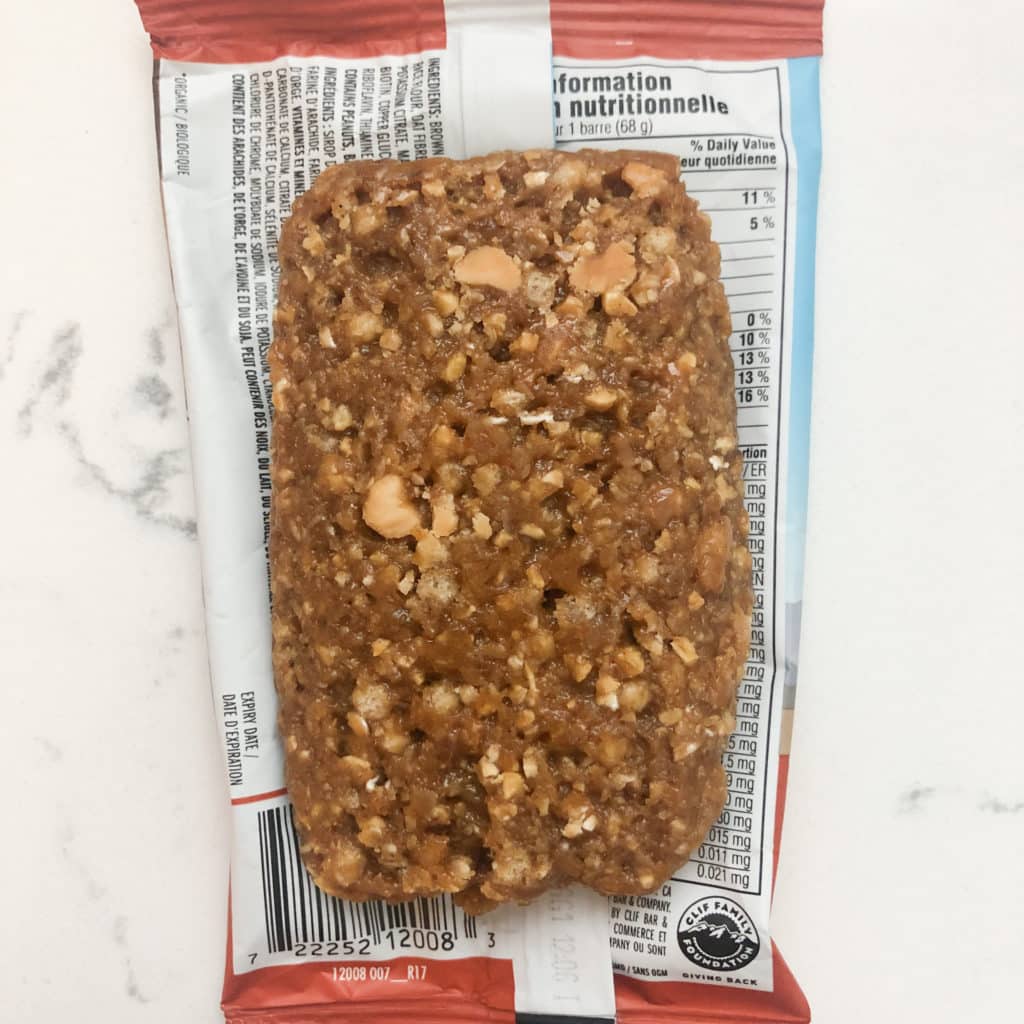
Clif bars have a soft, dense, chewy texture. The Crunchy Peanut Butter flavour has a strong peanut butter flavour. The whole oats and peanut chunks used in this bar are visible, giving it a chunky and less refined texture.
Ingredients
Clif promotes the ingredients used in these bars as sustainable. According to their website , their sustainable sourcing of ingredients includes:
- Connecting with farmers: ingredients can be traced back to where they come from
- Purchasing organic and certified-sustainable ingredients
- Reducing food waste at facilities
- Reducing and offsetting CO2 emissions generated by their business
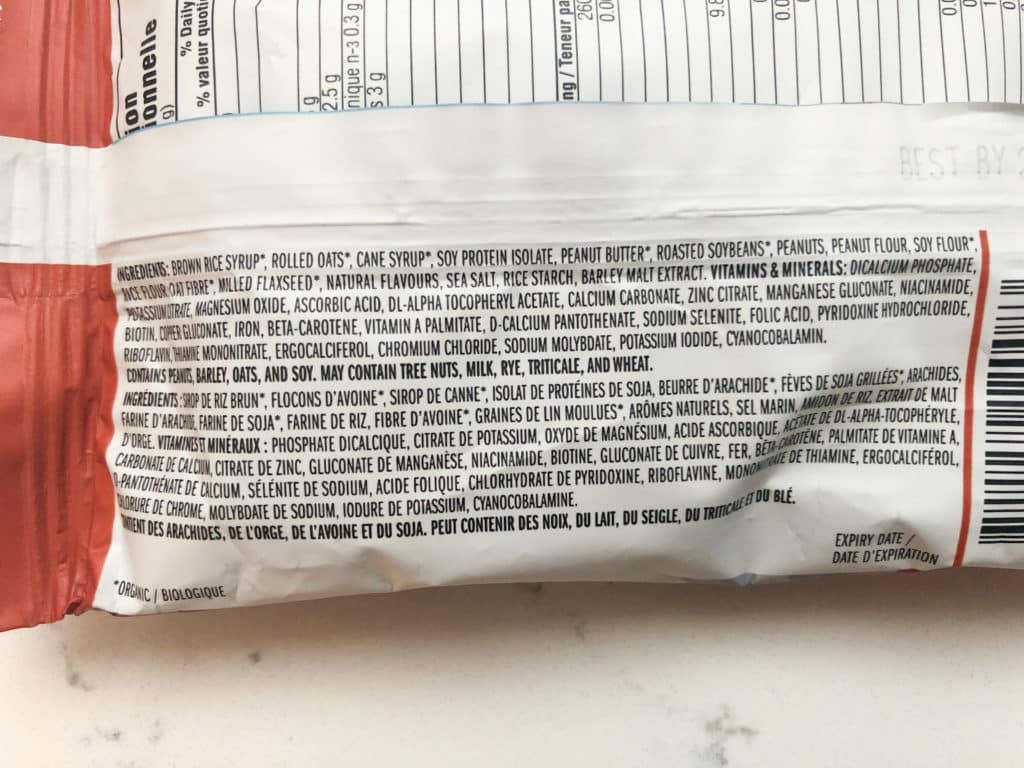
The first three ingredients in Crunchy Peanut Butter Clif Bars are brown rice syrup, rolled oats, and cane syrup. Since ingredients are listed by weight, we can assume that this is a higher sugar bar based on 2/3 first ingredients being sugar.
These bars use soy protein isolate as their main protein source, though the oats, peanut butter, flax seeds, and soybeans also contribute to the total protein count.
There are three flours used in these bars: peanut flour, rice flour, and soy flour.
Oat fibre is used as a fibre supplement. Oats, soybeans, and flaxseeds will also contribute to the total fibre count.
Natural flavours and barley malt extract are used to enhance the flavour of the bars. For more information about natural flavours, check out this blog post: What are Natural Flavours and Should you Avoid them?.
Clif bars also have several vitamins and minerals added that appear in the ingredient list:
Potassium citrate (potassium), ascorbic acid (vitamin C), DL-Alpha Tocopheryl Acetate (vitamin E), calcium carbonate (calcium), zinc citrate (zinc), manganese gluconate (manganese), niacinamide (vitamin B3), biotin, copper gluconate (copper), iron (non-heme), beta-carotene, vitamin A palmitate, D-calcium pantothenate (vitamin B5), sodium selenite (selenium), folic acid (vitamin B9), pyridoxine hydrochloride (vitamin B6), riboflavin (vitamin B2), thiamine mononitrate (vitamin B1), ergocalciferol (vitamin D2), chromium chloride (chromium), sodium molybdate (molybdenum), potassium iodide (iodide), cyanocobalamin (vitamin B12).
Priority allergens: the peanut butter crunch flavour contains peanuts, barley, oats, and soy. May contain tree nuts, wheat, milk, rye, and triticale. Note: some flavours also contain tree nuts.
Looking for allergen-friendly snack bar options? Check out our Allergen-Friendly Snack Bar Brands here.
Nutrition Profile
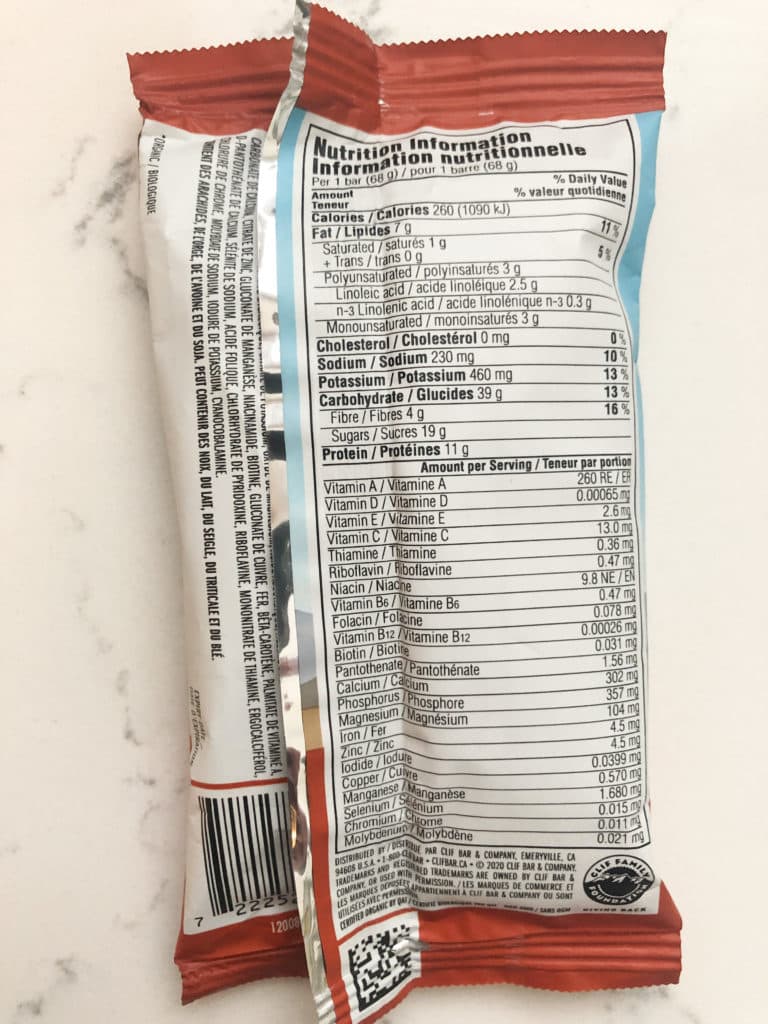
Note: for this review, we are using the nutritional profile from Crunchy Peanut Butter flavour.
Calories: this bar contains 260 calories, with calories ranging from 250-260 depending on the flavour. Compared to other nut-based bars or granola bars on the market, Clif bars are higher in calories. Compared to other energy bars on the market, Clif bars are moderate in calories.
Fat: this bar contains 7g of fat (5-7g depending on flavour). The fat sources in this flavour are peanut butter, peanuts, and flaxseed.
Carbohydrate: this flavour contains 39g of carbohydrates per bar (39-43g depending on the flavour). Carbohydrates are coming from brown rice syrup, oats, cane syrup, soy flour, rice, flour, and rice starch.
Fibre: there are 4g of fibre per bar coming from oats, soybeans, oat fibre, and flax seeds.
Sugar: each bar has 19g of sugar (19-21g depending on the flavour) coming from brown rice syrup and cane syrup.
Protein: there are 11g of protein per bar (10-11g depending on flavour) coming from soy protein, peanut butter, soybeans, and peanuts.
Other nutrients: Clif bars are supplemented with a variety of vitamins and minerals. They provide a significant source of iron, calcium, B vitamins, magnesium, and zinc.
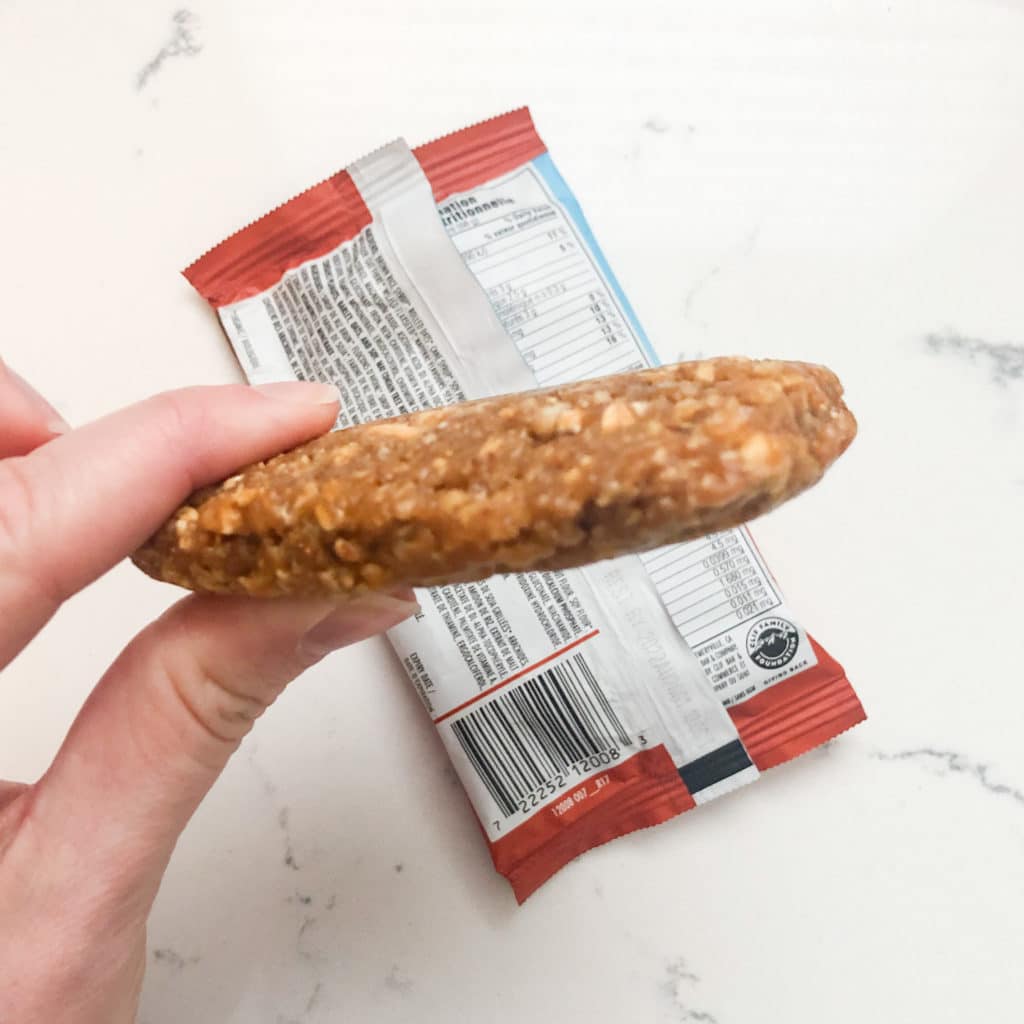
Cost:
The regular price for a box of 12 Cliff bars in Ontario ranges from $16.47-$22.99, making the price per bar $1.37-$1.92. At this price point, Clif bars are less expensive compared to other energy bars on the market.
Clif Bar – Dietitian Review
Are Clif Bars Healthy?
Clif bars are a suitable snack option for people with high carbohydrate needs, such as athletes or highly active individuals. These bars are nutrient-dense and energy-dense which can help those individuals to meet their high nutrient needs. They are also generally less expensive than other energy bars on the market, making them an appealing option for those on a budget.
Energy bars provide a processed and condensed source of nutrition which is not necessary for the average person to meet their nutritional needs. A whole-food-based snack such as peanut butter with apple slices or yogurt and fruit would provide protein, fats, and complex carbohydrates in a more satiating format.
Compared to lower-calorie nut-based bars or granola bars on the market (non-energy bars), Clif bars are much higher in sugar*. A balanced snack bar or protein bar may be a more suitable snack bar alternative for the average adult than a Clif bar or other energy bar. Check out our summary of the Best Healthy Snack Bars you can Purchase at the Grocery Store for our favourites.
*the sugar content of Clif bars is comparable to other energy bars on the market.
Suggested Uses
For individuals looking to supplement their diet with a concentrated source of energy and carbohydrate, such as an athlete or highly active individual, Clif bars can be a suitable option.
Pre-workout snack:
These bars may be suitable for a pre-workout snack for athletes or active individuals looking for a convenient snack. Though the timing of this pre-workout snack will depend on the individual’s digestion, most people would tolerate a Clif bar if consumed ~2 hours before exercise.
Mid-workout snack:
Clif bars can be a fuel source during low-moderate intensity endurance activities, such as a long hike when packaged snacks are most convenient.
Post-workout snack:
Clif bars may be suitable as a post-workout snack for athletes or highly active individuals looking for a prepackaged option. Though most adult athletes will require more protein as part of their recovery meal/snack than Clif bars provide.
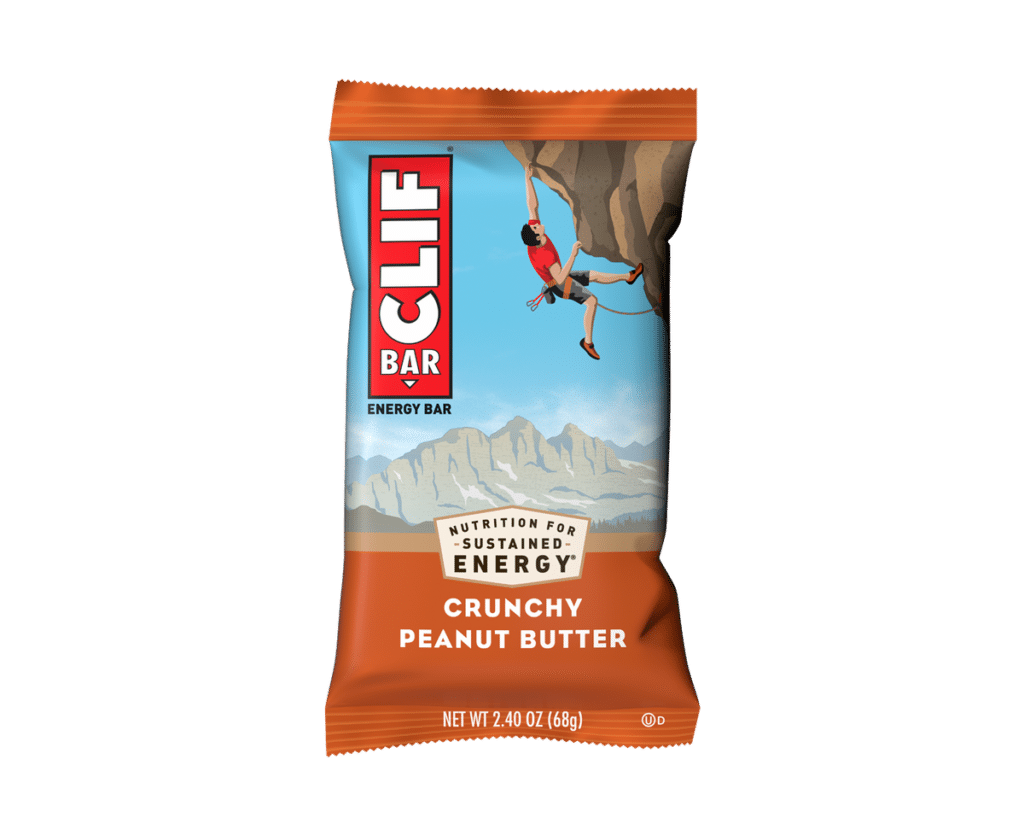
Do Clif bars live up to their marketing claims?
Claim #1: “the ultimate energy bar”
Clif bars are a solid option in the energy bar category. The nutrition profile is suitable as an energy bar and the ingredients seem less processed than some other energy bars on the market.
Claim #2: a performance bar that will “keep your adventure going”
The nutritional profile of Clif bars is suitable for endurance-based activities such as a long hike.
Frequently Asked Questions:
Do Clif bars give you energy?
In short, yes. Cliff bars provide ~260 calories per bar, with 62% of calories coming from carbohydrates, the macronutrient that our body uses as an energy source.
Do Clif bars make you gain weight?
No single food will cause weight gain. Clif bars can contribute to weight gain if the overall calorie intake is higher than the individual’s needs.
It is easier to consume excess calories from energy-dense foods such as Clif bars or other energy bars, as they are denser and less filling than whole foods.
As such, Clif bars may be a helpful tool for those looking to gain weight. For people who do not have a goal of weight gain, a whole food snack or non-energy bar is a more suitable option.
Are Clif bars good meal replacements?
Based on the nutrition profile, Cliff bars are not a meal replacement. Compared to a balanced meal, Clif bars are higher in sugar and lower in protein, calories, and fibre.
How much sugar is in a Cliff bar?
Clif bars have 19-21g of sugar. The sugar sources are brown rice syrup and cane sugar. This is high compared to other snack bars on the market, but comparable to other energy bars.
What are Clif bars made of?
Clif bars are oat-based energy bars. They contain:
- Oats: whole oats and oat fibre
- Protein: soy protein isolate
- Flours: soy flour and brown rice starch
- Sugar: brown rice syrup, cane syrup
- Other: roasted soybeans, ground flaxseeds, barley malt extract, natural flavours, sea salt
- Depending on the flavour, Clif bars may contain chocolate, peanuts, and/or tree nuts.
Do Clif bars contain milk?
Clif bars list milk as part of the ‘may contain’ statement. The ‘may contain’ statement is a precautionary statement that food companies use when there is a risk of contamination with an allergen that isn’t an ingredient.
Clif Bar – Dietitian Review
Are Clif bars gluten-free?
Clif bars contain barley and are not gluten-free. Rye, wheat, and triticale are also listed under the ‘may contain’ statement.
Do Clif bars contain soy?
Yes. Clif bars contain soy isolate, soy flour, and roasted soybeans.
Are Clif bars nut-free?
No. Depending on the flavour, Clif bars contain or may contain peanuts and/or tree nuts.
Are Clif bars vegan?
Clif bars are made primarily with plant-based ingredients. The ingredients in the classic Clif bar flavours are vegan-friendly, though they include milk as part of the may contain statement.
Are Clif bars healthy for runners?
Clif bars are carbohydrate-dense and can be a good option for long-distance runners who struggle to meet their carbohydrate needs from whole foods alone.
Are Clif bars good for cycling?
Clif bars are carbohydrate-dense and can be a good option for endurance athletes, such as cyclers, who struggle to meet their carbohydrate needs from whole food sources alone. They may also be suitable for a mid-exercise snack during prolonged endurance activity, as tolerated.
Clif Bar – Dietitian Review
How many calories are in a Clif bar?
There are 250-260 calories per Clif bar. This is moderate compared to other energy bars on the market.
Are Clif bars good to eat after a workout?
Clif bars are a source of carbohydrates and protein and may be suitable as a post-workout snack for those struggling to meet their needs from whole food.
Some athletes may require more carbohydrate and/or protein post-workout than Clif bars provide.
Energy bars are not generally necessary for recovery for recreational athletes or those with weight loss goals. In this case, a whole-food-based recovery meal or snack is a better option as it will provide more balanced nutrition and be more satiating.
Are Clif bars good to eat before a workout?
The best pre-workout meal or snack will depend on the individual’s digestive tolerance, nutritional needs, and daily nutrient distribution. Generally speaking, the carbohydrate: protein ratio in Clif bars is suitable for pre-workout.
The protein, fat, and fibre content of Clif bars may increase the risk of adverse gastrointestinal symptoms if consumed too close to a workout. However, most individuals will tolerate a Clif bar ~2 hours pre-workout.
Are Clif bars a good protein bar?
Clif bars contain ~10-11g of protein per bar which is an appropriate snack portion of protein for the average adult. However, Clif bars are energy-dense and high in added sugar, which may not be necessary for the average adult to meet their daily nutritional needs.
Is it OK to eat a Clif bar every day?
Most people do not need to consume energy bars to meet their daily nutritional requirements. A protein bar or nut-based bar (non-energy bars) is a more suitable option for a daily snack for the average adult.
For athletes or those with higher nutritional needs, energy bars such as Clif bars can be a tool to help supplement the diet and meet your needs when you’re unable to do so from whole food alone. In this case, daily use of Clif bars may be beneficial.

